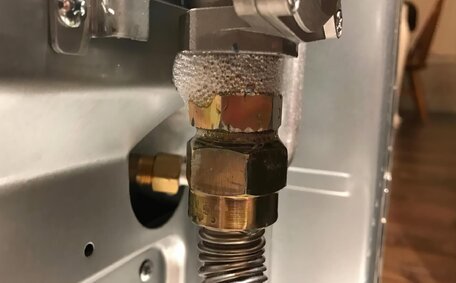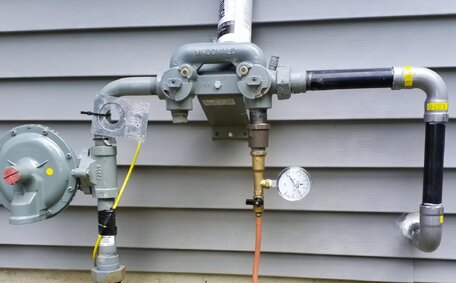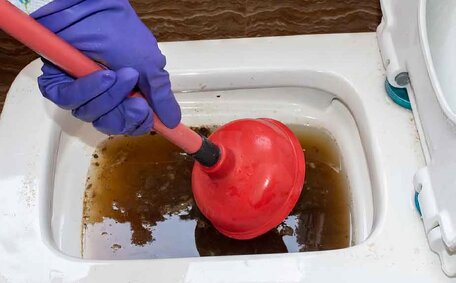What causes hot water to smell like rotten eggs?
Identifying the cause of your hot water’s rotten egg smell is crucial, and it commonly traces back to hydrogen sulfide gas. This gas is produced when sulphate-reducing bacteria impinge on your water heater tank and plumbing. These bacteria in your hot water heater consume sediments and the magnesium anode resulting in the production of hydrogen sulfide gas.
When run, the hot water releases hydrogen sulphide gas into the air, fuelling the unpleasant odour that typically smells like rotten eggs. If unaddressed, the buildup of hydrogen sulfide gas can spread a sulfurous odour throughout your home.
In most cases, contributing factors to the rotten egg smell hot water may involve:
- A degraded or failing anode rod, potentially instigating all your rotten egg odour troubles
- High levels of sulphur in your water supply
- Sediment build-up in the tank that may escape into your drains and taps
- Nearby your gas wells or naturally occurring hydrogen sulphide in groundwater (common in certain geographical locations like Kenthurst, Sydney)
The most surefire method to combat a rotten egg smell in hot water is replacing your tank’s anode rod and giving the water heater a thorough flush to dislodge sediment.
An inline water purification system can reduce sulfur smells and prevent bacterial growth, crucial when your water has a rotten egg scent. Should odours persist, it may be necessary to replace the water heater entirely.
Hydrogen sulfide gas
You may be questioning how hydrogen sulfide gas is linked to your water’s rotten egg odour. If so, it’s likely due to hydrogen sulfide (H2S) gas, a common cause of this issue in hot water. This colourless gas, responsible for the consistent rotten egg odour, forms when bacteria degrade organic matter in water, particularly prevalent in sulfide-rich well or groundwater sources, hence the odor coming your water.
In Kenthurst, where well water is a main source, the distinctive smell of rotten eggs is a recurring problem. Heating the water releases the gas, explaining the rotten egg scent when you run hot water.
As sediment builds in your tank over time, a stronger water heater smell can be produced. Beyond an offensive smell, heavier gas concentrations can corrode pipes and tank components, risking leaks or tank failures.
Replacing your anode rod, flushing the tank, and installing a water softener system are key strategies to mitigate a hydrogen sulphide issue. Although not acutely perilous in the levels generally present in homes, it’s wise to avoid prolonged exposure, as the bacteria could prompt issues, entailing the difficulty of removing the odour from both hot and cold water.
Sulfate-reducing bacteria
Sulfate-reducing bacteria, which can release hydrogen sulfide that afflicts your water tanks, are typically found in groundwater, wells, and water distribution systems. As the name suggests, these bacteria derive energy by reducing (removing the oxygen from) sulphate compounds.
Within your water heaters, SRBs churn out hydrogen sulfide as they break down sulphate compounds, If your water contains organic matter like sediment or magnesium from anode rods, bacteria could be an issue. This gas is what causes the rotten egg odour in hot water.
SRBs thrive in hot water tank environments, where there is low oxygen and mild water temperatures. Sediment accumulation and the presence of sulphates in well water provide ideal conditions for SRB growth.
To control SRBs and prevent the smell caused by sulphurous emissions, anode rods should be replaced, tanks flushed regularly, and water filters installed. Regular maintenance such as draining sediment and replacing worn components is crucial in preventing SRB proliferation and hydrogen sulfide emission.
Replace the anode rod
Replacing your anode is an important step to stop the rotten egg smell and prevent further bacteria growth in your water heater.
Here’s how to turn hot water maintenance from a chore into a simple task with an anode rod replacement:
- Turn off the power and water supply to the heater, involving flipping the circuit breaker, closing the gas valve, and shutting the cold water intake valve to address potential sulfur odours.
- Attach a garden hose to the tank’s drain valve and position the other end away from your kitchen or yard to drain the tank safely.
- Remove the old anode rod with a socket wrench. Ensure you note the rod’s dimensions to secure a precise fit, thereby preventing the rotten egg smell.
- Clean the threads in the tank opening with a wire brush or towel.
- Apply pipe thread sealant to the threads of the new rod and hand tighten until snug.
- Refill the tank by turning the hot tap water supply back on. Check for leaks at connections.
- Restore power to the water heater and allow it to reheat the water. Flush hot water through all faucets.
Opting for an aluminium-zinc alloy or powered anode rod, you’ll need to consult with your local plumber to ensure it combats hard water areas, offering formidable protection against corrosion and bacterial expansion, vital for sustaining a healthy hot water system. You’ll need to consult with a local plumber to select the appropriate replacement anode rod tailored to your home’s water characteristics and pipework.
Flush the water heater
Flushing your heater is crucial since removing sediment can substantially mitigate bacteria proliferation, which often contributes to cold water smell. This helps eliminate rotten egg odours and restore efficient hot water heating.
Follow these steps for flushing your water heater:
- Turn off power to the water heater and shut off the cold water intake valve, then prepare to flush your faucets.
- Attach a garden hose to the tank’s drain valve, leading the other end outside or into a bucket.
- Open the drain valve, allowing water to flow out until it appears clear, indicating removal of impurities.
- Close the drain valve and Open a hot and cold water tap to enable air to re-enter the tank.
- Refill the tank with cold water to expel air, then, once finished, restore power to the heater.
- Restart the heater and flush the hot water from all water points once it reaches full temperature to ensure there’s no lingering smell in your supply.
Prevent bacteria proliferation and sediment accumulation in your water heater by performing a biannual flush. Updating your plumbing with new pipes can also drastically reduce contamination risks. For proficiently tackling water heater repair or replacements, our team of experts stands ready to provide skilled assistance.
Install a water treatment system
Installing a dedicated water treatment system can help eliminate the rotten egg smell your hot water may have and prevent hydrogen sulphide gas issues.
Common treatment options for sulfur bacteria include:
- Whole house chlorination - Chlorine systems eradicate bacteria and neutralise hydrogen sulfide compounds, enhancing the quality of your soft water and reducing the chance of unpleasant odours.
- Carbon filters - These systems filter out sulfur, hydrogen sulfide gas, and remove sediment, ensuring cleaner water circulation inside your home. Require regular filter changes.
- Water softener systems - Remove minerals that bacteria feed on and prevent scale buildup.
- Reverse osmosis systems - Use a membrane to remove dissolved solids, gases and bacteria.
- UV sterilisation - UV light kills bacteria and prevents future growth.
Professional installation is recommended to ensure the treatment method effectively neutralises the egg smell in harmony with your water chemistry and plumbing.
Whole house filtration or chlorination is effective in the Kenthurst area for managing hydrogen sulfide issues from local groundwater. Carbon tank filters, by removing sulfur, also curb bacteria growth that causes rotten egg odours.
An experienced, licenced plumber can advise on the pros and cons of different water treatment options for lasting elimination of the rotten egg smell from your tap. Annual maintenance for most systems is necessary to ensure optimal operation.
When to call a professional plumber
If the rotten egg smell continues despite your troubleshooting efforts, seek a professional plumber’s assistance. A persistent foul odour may have you pondering why your tap water emits a smell like rotten eggs? It likely indicates problematic bacteria growth, corrosion, or sediment buildup; You might wonder, 'Why does my tap water smell like this?' necessitating a skilled assessment and repair.
Warning signs to contact Kenthurst Plumbing include:
- The persistent rotten smell lingers even after draining the tank, flushing the heater, and replacing the anode rod
- The water heater is over 8 years old and due for inspection or replacement
- Signs of a hydrogen sulphide gas leak like the smell of rotten eggs near the hot water tank
- Discoloured water or changes in water pressure at your sink and coming from hot water taps
- Knocking, rumbling or odd noises from the water heater
- Visible corrosion like rust stains or mineral deposits on exterior pipes and fittings
Our qualified technicians can accurately diagnose and address issues causing the rotten egg smell from your system. We can scrutinise your water heater, pipes, and advocate the optimal solutions, pinpointing the root cause, be it tank flushing, filtration system installation, leak repair or complete unit replacement.
For reliable assistance to get rid rotten egg odours or other hot water system issues, contact the professionals at Kenthurst Plumbing today. Call us at 1300 349 338 or email [email protected] to discuss your needs.






